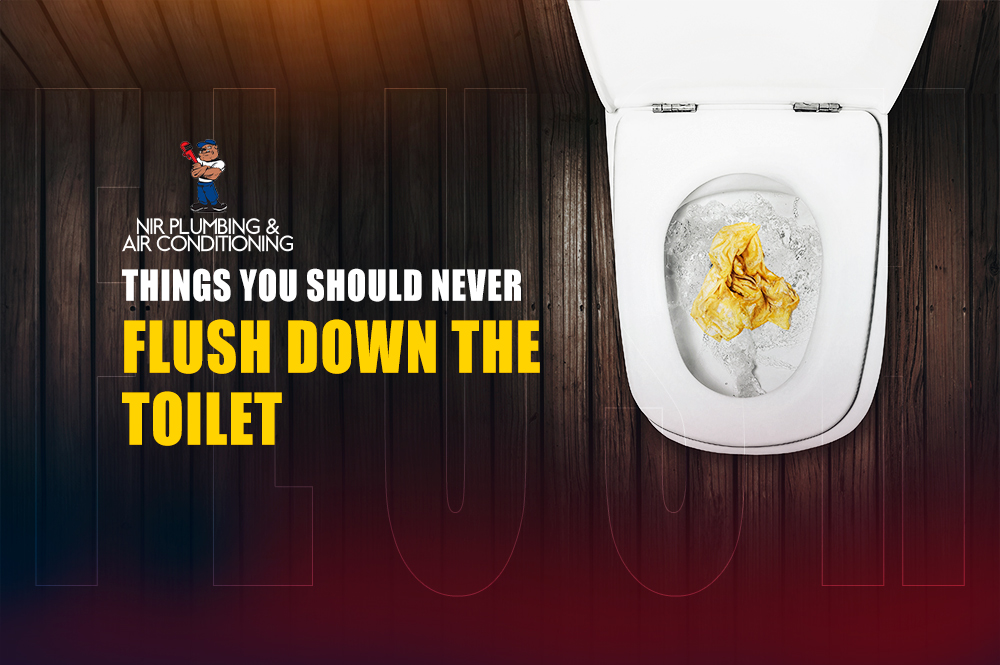Overview: Toilet troubles? Discover the “dos and don’ts” in our latest blog. From the secrets of “flushable” wipes to the silent saboteur, hair, we’ve got the scoop on keeping your plumbing pristine. Your plumbing will thank you!
We all take the convenience of our toilets for granted, but have you ever stopped to think about what happens after you flush? Your trusty porcelain throne may seem like a magical portal that whisks away everything you don’t want to see again, but the truth is, not everything is meant to go down there.
Picture this: you’re going about your daily routine, minding your own business, when suddenly, disaster strikes. Your toilet starts to gurgle ominously, and panic sets in as you realize that you might have inadvertently flushed something down that should never have seen the inside of a toilet bowl.
Sounds scary, right? In this blog post, we’ll explore the secret life of sewers and discuss six things you should never flush down the toilet.
Flushable Wipes
Flushable wipes, often marketed as a convenient alternative to traditional toilet paper, have gained popularity in recent years. The trouble lies in the term “flushable,” which can be misleading. Unlike toilet paper designed to disintegrate quickly, these wipes are made of sturdier materials that don’t break down as easily.
As they journey through your plumbing, they can accumulate and combine with grease, forming a congealed mess that can lead to stubborn clogs. To avoid potential plumbing woes, consider keeping a small trash bin in your bathroom exclusively for disposing of “flushable” wipes.
>> Related Reading: Dangers of Flushing Those Flushable Wipes
Hair — The Silent Saboteur
We’ve all experienced the shedding of hair during our daily grooming routines. However, what many don’t realize is that hair is a silent saboteur when it comes to plumbing. Strands of hair can intertwine with soap scum, toothpaste, and other debris, creating a web-like blockage in your pipes.
To combat this, invest in a drain catcher or hair trap. These inexpensive devices can be easily installed in your shower or bathtub drain, preventing hair from making its way into the plumbing labyrinth beneath.
Cotton Swabs and Cotton Balls
Cotton swabs and balls, while seemingly innocent, are not designed to disintegrate in water. When flushed, they can gather in the twists and turns of your plumbing, forming a barrier that restricts water flow. If you find yourself in the habit of flushing these items, consider placing a small waste bin near your toilet.
This simple change can save you from plumbing headaches and ensure that your pipes remain debris-free.
Medications
The temptation to flush expired or unwanted medications down the toilet may seem like an easy solution, but it poses serious environmental risks. Flushed medications can contaminate water supplies, impacting aquatic ecosystems and potentially harming wildlife.
Instead of contributing to this ecological problem, check if your local participates in a drug take-back program. If not, follow specific guidelines provided by authorities on proper medication disposal.
Dental Floss
Dental floss, with its thin and stringy nature, is another seemingly harmless item that can wreak havoc on your plumbing. Its ability to wrap around other debris can lead to the creation of a dense, clog-inducing mass. Make it a habit to dispose of dental floss in the trash to prevent potential plumbing nightmares.
By doing so, you’re not only protecting your pipes but also contributing to a smoother and more efficient wastewater treatment process.
>> Related Reading: Can You Flush Dental Floss Down the Toilet?
Paper Towels and Tissues
In times of necessity, desperate people might reach for paper towels or tissues as a substitute for toilet paper. However, these materials are specifically designed to be more robust and do not break down as easily. Flushing paper towels or tissues can lead to blockages, especially in older plumbing systems.
Stick to the one-time use, one-time flush rule, and reserve paper towels and tissues for the trash bin. Your plumbing will thank you for the consideration, and you’ll be doing your part in maintaining a trouble-free wastewater system.
In Summary
In the world of toilets and plumbing, what goes down doesn’t always go away smoothly. By being mindful of what you flush, you can prevent costly and inconvenient plumbing issues. Remember, the toilet bowl is not a universal disposal unit.
Treat it with care, and your plumbing will thank you for it. So, the next time you’re about to send something on a watery journey, ask yourself: should it really take the plunge?
Flush away your plumbing worries with NIR Plumbing! Our expert team is ready to tackle any issues caused by flushing the wrong items. Schedule a routine check-up today to keep your pipes clog-free and your toilets flowing smoothly. Contact NIR Plumbing for reliable, professional service – because prevention is the key to a trouble-free plumbing system.
Don’t wait; call us now!


